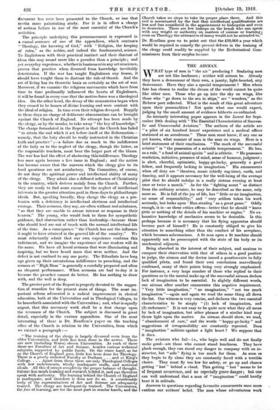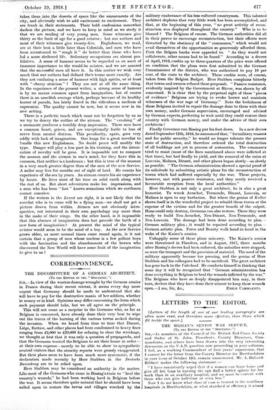THE AIRMAN.
WHAT type of men is " the air " producing ? Seafaring men are not like landsmen ; neither will airmen be. Already they have a demeanour of their own, a jaunty, light-hearted, airy demeanour. Have they also a special temperament ? Men whom fate has chosen to realize the dream of the world cannot be quite like other men. Those who go up into the sky on wings, like those who " go down to the sea in ships," see " wonders," as the Hebrew poet reflected. What is the result of this great adventure upon their personalities ? Not quite what one would expect, judging by the small amount of evidence hitherto co-ordinated.
An intensely interesting paper appears in the Lancet for Sept- ember 28th dealing with " The Essential Characteristics of Success- fu' and Unsuccessful Aviators." The authors of the article are " a pilot of six hundred hours' experience and a medical officer stationed at an aerodrome." These men must know, if any one as yet knows, what manner of man is the man on wings. Here is a brief statement of their conclusions. " The mark of the successful aviator " is " the possession of a suitable temperament." He has, as a rule, " a fund of animal spirits " and is athletic. " He possesses resolution, initiative, presence of mind, sense of humour, judgment; is alert, cheerful, optimistic, happy-go-lucky, generally a good fellow, and frequently lacking in imagination." His amusements when off duty are " theatres, music (chiefly rag-time), cards, and dancing, and it appears necessary for the well-being of the average pilot that he should indulge in a really riotous evening at least once or twice a month." As for the " fighting scout " as distinct from the ordinary aviator, he may be described as the same, only more so. He is full of the joy of life, has " little or no imagination, no sense of responsibility," and " very seldom takes his work seriously, but looks upon Hun-strafing ' as a great game." Oddly enough, it is—so these critics affirm—better that he should " know little or nothing of the details of his machine or engine." No ex- haustive knowledge of mechanics seems to be desirable. Is this perhaps because it is necessary that his flying apparatus should become part of himself ? He is constantly obliged to give his attention to something other than the conduct of his aeroplane, which becomes subconscious. A fit man upon a fit machine should apparently not be preoccupied with the state of his body or its mechanical adjuncts.
Being absorbed in the interest of their subject, and anxious to compare their observation with that of others in a good position to judge, the airman and the doctor issued a questionnaire to fully qualified pilots, and found their own conclusions marvellously confirmed, many of their points being very strongly emphasized. For instance, a very large number of those who replied to their questions as to the mental make-up of the successful airman declare lack of imagination to be essential. In slightly different words, one airman after another enumerates this negative requirement. " Very little imagination," " no imagination," " not too much imagination "—again and again we read the same thing all down the list. One witness is very concise, and declares the two essential characteristics to be simply " (1) lack of imagination, and (2) endurance." It is not easy to be quite sure what they all mean by lack of imagination, but other phrases of a similar kind may throw light upon the matter. An airman should show, we read, " abandonment of care," and the words " happy-go-lucky " and suggestions of irresponsibility are constantly repeated. Does " imagination " militate against a light heart ? We suppose that it does.
The aviators who fail—i.e., who begin well and do not finally make good—are those who cannot stand loneliness. They have pluck enough, they can stand any danger in company with an in- structor, but " solo " flying is too much for them. As soon as they begin to fly alone they are constantly faced with a terrible choice. They must fly too low for safety, or go up and chance getting " lost " behind a cloud. This getting " lost " seems to be of frequent occurrence, and no especially grave danger; but one can well understand that a man of " imagination " could hardly bear it in solitude.
Answers to questions regarding favourite amusements once more confirm our authors' belief. The men whose adventurous work
takes them ,into..the deserts of space like the amusements of the city, and. obviously wish to add excitement to excitement. They are frank in their statements. Their bold confessions somewhat darken the picture; and we have to keep in mind as we study it that we are reading of very young men. Some witnesses give thirty as the limit of age for a good aviator ; but our authors and most of their witnesses give twenty-five. Englishmen, we read, are at their best a little later than Colonials, and men who have been accustomed to " rough it " do better than those wk., have led a more sheltered life. Sedentary occupations are almost pro- hibitive. A sense of humour seems to be regarded as an asset of immense importance to the would-be aviator, and we are assured that the successful ones all have it. In this matter we wish very much that our authors had defined their terms more exactly. Are they not confusing a sense of humour with high spirits, or at least with " cheery stoicism " ? They are not at all the same thing. In the experience of the present writer, a strong sense of humour is by no means common apart from imagination, but of course there is an unselfish courage which, perhaps because of its healthy horror of parade, has lately found in the ridiculous a medium of expression. The quality cannot be new, but it seems new in its new setting.
There is a pathetic touch which must not be forgotten by us as we try to descry the outline of the airman. The " crashing " of a messmate produces a terribly deep impression. These men have a common heart, grieve, and are exceptionally liable to loss of nerve from mental distress. This peculiarity, again, goes very oddly with lack of imagination. One longs for a great novelist to handle this new Englishman. No doubt peace will modify the type. Danger will play a less part in his training, and the intoxi- cation of novelty will be gone. It is impossible not to compare the seaman and the airman in one's mind, for they have this in common, that neither is a landsman ; but this is true of the seaman in a very much greater degree than of the men of the new Service. A sailor may live for months out of sight of land. He counts his experience of the sea by years. An airman counts his air experience by hours. He lives most of his time on solid earth along with the rest of us. But short adventures make Ion impressions, and a man who has been " lost " knows sensations which we earthmen cannot conceive.
If the writers in the Lancet are right, it is not likely that the novelist who is to come will be a flying man—we shall not get a picture drawn from within. Airmen are not obviously intro- spective, not interested in their own psychology any more than in the make of their wings. On the other hand, is it impossible that this absence of imagination does but precede the birth of a new form of imagination ? At present the mind of the typical aviator would seem to be the mind of a boy. As the new Service grows older, as more normal times come round again, is it not- certain that a group of men whose nucleus is a few gallant boys with the fascination and the abandonment of the heroes who discovered the New World will have some fruit of the imagination to give to us ?



































 Previous page
Previous page